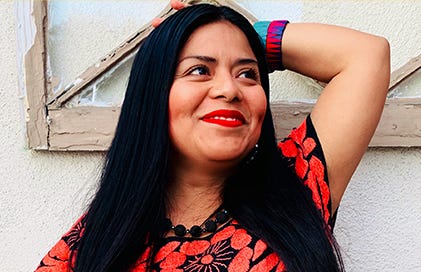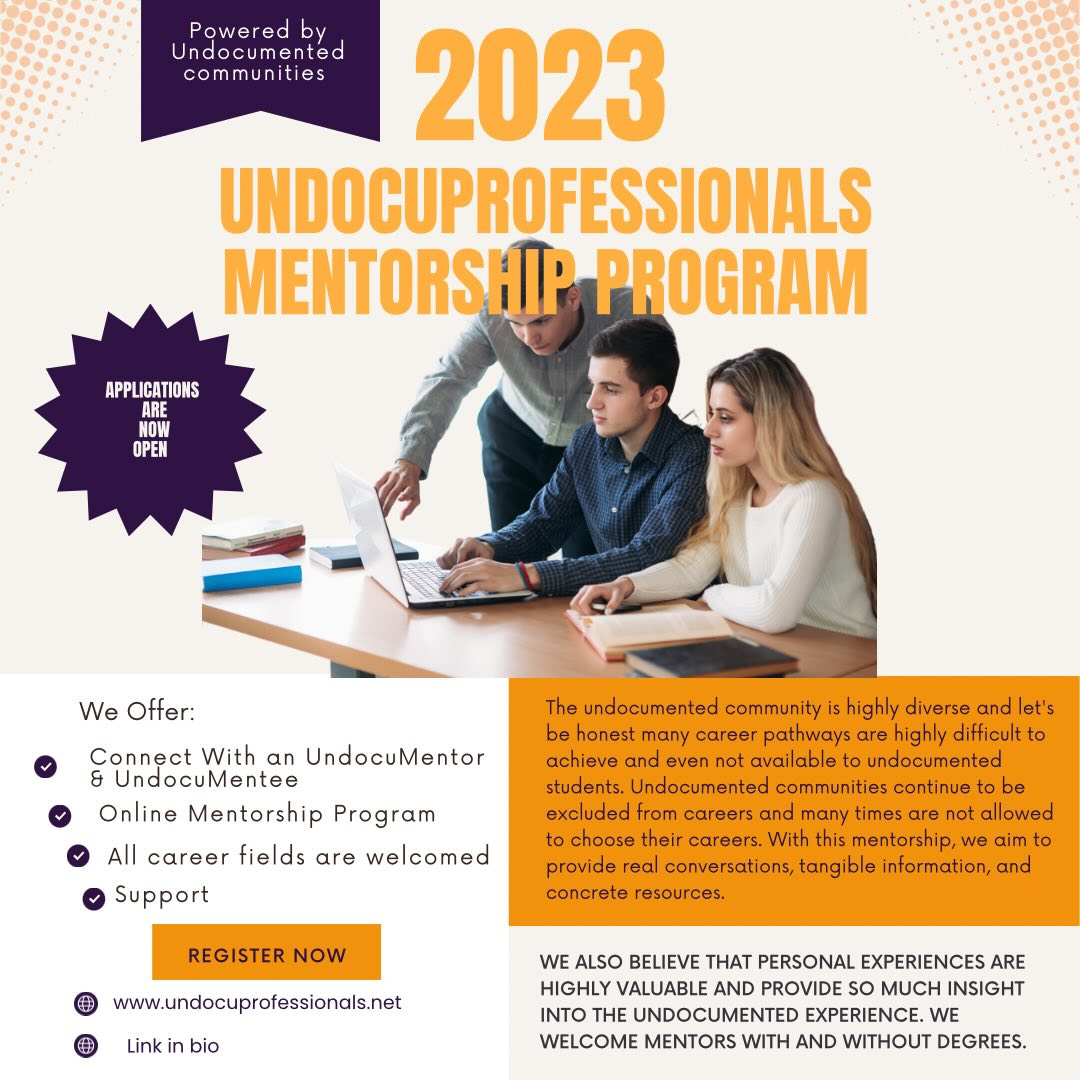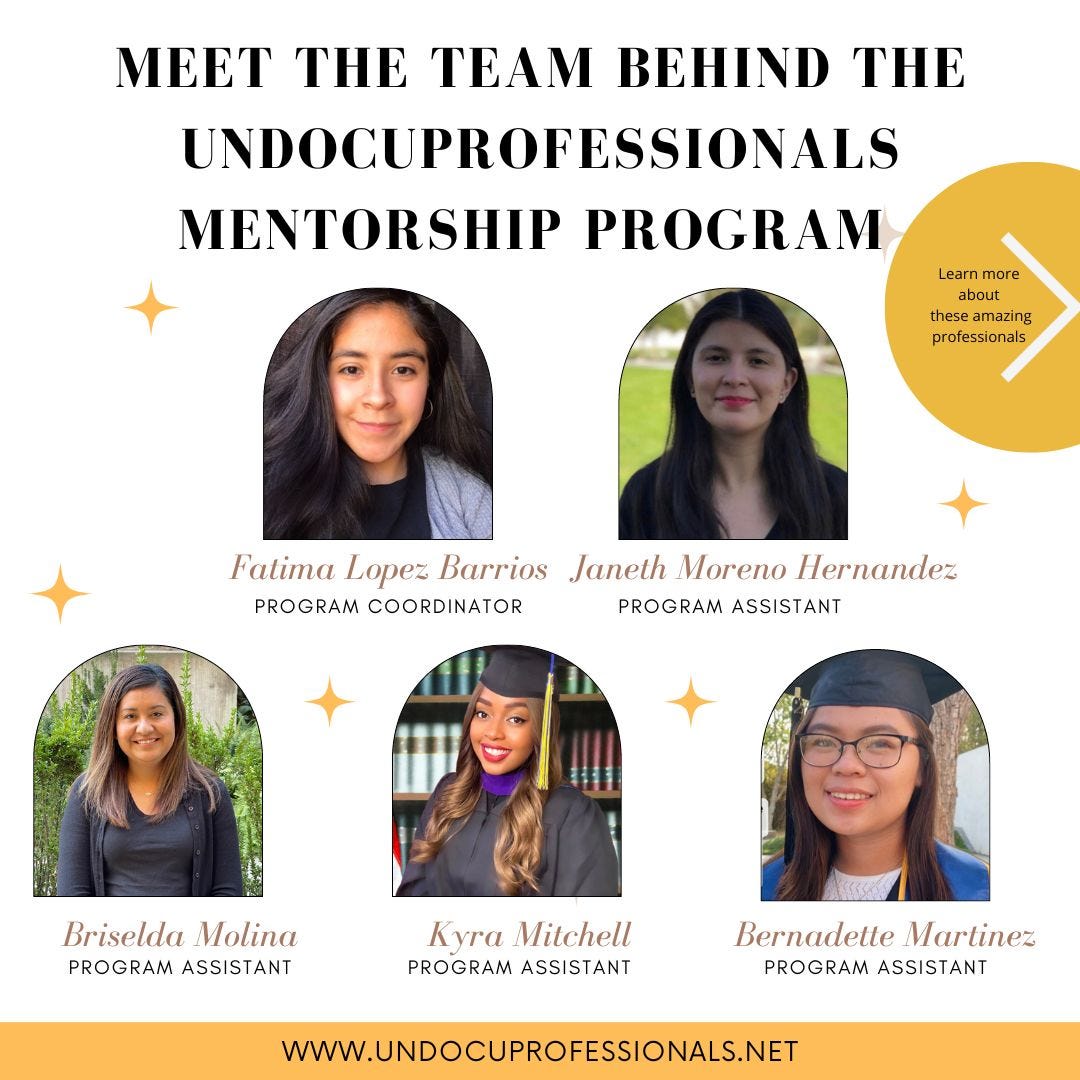Supporting UndocuProfessionals through mentorship and networking with Sharet Garcia
The UndocuProfessionals founder describes the Annual Virtual Mentorship Program
“How can I help?” It’s one of the most common questions we hear from well-intentioned individuals and organizations looking to support the undocumented community. The kinds of support needed is overwhelming, highly complex, and often requires first-hand experience. Enter the UndocuProfessionals Annual Virtual Mentorship Program. This week, UndocuProfessionals founder, Sharet Garcia, describes how this free program partners members of the undocumented community to gain key skills and networks to thrive in particularly difficult times.
Currently accepting applications for its sixth cohort of participants, Garcia describes who should apply for this mentorship program. She shares what they might expect through participation, and—next week—she elaborates on how she went from quietly working toward a career in academic counseling to founding one of the largest online networks supporting the undocumented community.
Antero Garcia: Can you say a bit about what this mentoring program is and who it is for?
Sharet Garcia: I'm very excited to share that the UndocuProfessionals Mentorship Program is 100% led and empowered by the undocumented community. All of our undocumentors are either undocumented or formerly undocumented TPS holders.
We welcome any mentee to sign up for the mentorship program. By the end of the program, the goal is for mentees to achieve at least one thing from it. We also welcome individuals in different phases of their careers that identify as undocumented or formerly undocumented, TPS holders, DACA recipients, to apply to become mentors, if this is something that they have the capacity to do.
AG: How much does the program cost?
SG: It is a free program, so right now no one is getting paid, unfortunately; we're trying to change that. Mentors donate their time at this time: which, again, we're really aiming to change in the future.
It is also a national mentorship program, which means it's available for everyone, not just for those in California. I am in California, and a lot of our mentors are actually from California. Since it is a virtual mentorship program, this makes it more accessible. We know that so many other states are not very undocu-friendly or have many undocu-resources. So we hope that this could be some kind of help to those states that continue to exclude the undocumented community from a lot of resources.
AG: Is the program predominantly in English?
SG: Yes, unfortunately it is. Because the goal of the mentorship program is to connect an undocumentee with an undocumentor, we try to make it the best possible match. So, if they put on their application that they prefer that they have someone that speaks Spanish or another language, we will do our possible best to match them with someone that also speaks Spanish.
AG: What have you learned from running this program? How has it changed?
SG: Every year we're trying to expand and make improvements to the mentorship program. This is going to be our sixth mentorship program. We have supported over 400 mentees, and we have over 400 mentors that have been part of this program already in the different fields.
One of the things that we are doing every year is trying to learn from the prior mentorship program and try new things. We offer professional development workshops just for our mentors and mentees. We've had everything from financial education workshops to mental health workshops to traveling while undocumented. Throughout the program, we’ll offer 3 to 5 workshops and we try to make it a requirement for both mentees and mentors to attend at least two of those events.
We also have networking opportunities. And one of the other things that you get from this mentorship program is access to the UndocuProfessionals online community. Right now we have over 300 members in the online community.
AG: Just hearing all of this, you sound incredibly busy. Knowing you're doing all the organizing behind the scenes, are you ever a mentor in this program?
SG: Unfortunately I have not been a mentor, but I try my best to be available and support. I have to give a lot of credit to our mentorship program team. In addition to myself, there is usually four or five other people doing a lot of the work.
AG: Is it difficult to find mentors for this program?
SG: There's always a need of mentors. I can tell you that within the first two days that we opened applications, we already had over 50 mentees and only 20 mentors.
AG: And you try to create a one one-to-one pairing?
SG: We do our best to do one-to-one, just because the mentor is already not getting compensated for their time. We also try to make sure that in our program structure of this mentorship program, that we help the undocumentor also get something out of this program because we value our time. We provide additional resources for them, help prepare them, and try to help them be the best possible mentors they can be.
One of the big projects that I'm taking on for UndocuProfessionals is to continue to push for paid opportunities for the undocumented community.
For this year’s mentorship program we're trying to add additional services at the end for our mentors. They already gave their time, their knowledge; how can we continue to support them? And I think this an additional opportunity for us to continue supporting them is by building a network of mentors. We hope this could also be used to support similar programs, schools, and organizations in the future.
Propina
If this mentorship program sounds like something that could help you or if you want to support others through this program, please consider applying as a mentor or mentee.
And if you are unfamiliar with UndocuProfessionals, check out their Instagram and website.
We’ll be back next week to learn a bit more about the origins of UndocuProfessionals.









Thank you Sharet! We need more leaders like you. Your work is inspiring beyond words.
An amazing program!